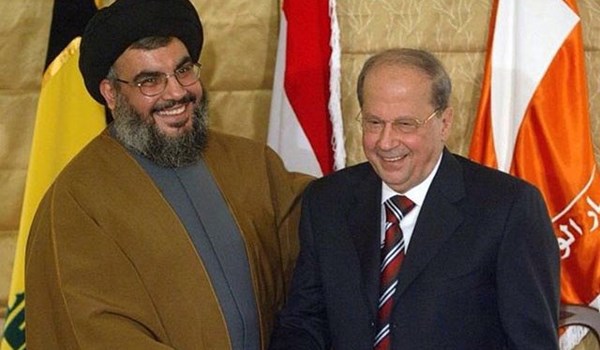
RNA - The Lebanese president this week visited Egypt and Jordan and this comes after his January visit to Saudi Arabia and Qatar.
Aoun has visited these countries which are all principally opposed to the Lebanese resistance movement Hezbollah but this has not affected his unwavering support for the resistance. In an in an interview with CBC Egypt before his visit to Cairo, Aoun reiterated that Hezbollah’s weaponry was complementary to the army’s action, and do not oppose it. “As long as a part of the territory is occupied by ‘Israel’, a regime which covets Lebanese natural resources, and as long as the army is not powerful enough to face Israel, we feel the need to maintain Hezbollah’s weapons. These weapons complement the action of the army,” President Aoun underscored. He pointed out that, were it not for the resistance’s pressure, the Israeli regime wouldn’t have withdrawn from most of the Lebanese territory.
“Hezbollah’s arms are not contradictory to the state project, which I support and for which I endeavor,” he pointed out.
Aoun reiterates close ties with Iran
Aoun's visit to Arab countries has also not affected Lebanon's close and friendly ties with Iran.
After his January visit to Saudi Arabia, Aoun pointed out that his country will continue to maintain close ties with Iran. "We have normal relations with Iran," which "shouldn't be a barrier in the face of normal relations with the Arab world," Aoun said. He also dismissed speculations that Lebanon is envisaging a cap to Iran's support for Hezbollah, saying Tehran has no limit in its plans for assisting the resistance. Aoun said Iran's support for Hezbollah "could continue indefinitely".
Aoun visited Egypt on Monday where he held talks with his Egyptian counterpart Abdel-Fattah El-Sisi. During a joint press conference, El-Sisi said that Egypt is confident that Aoun's term will strengthen Lebanon’s character as a country that enjoys pluralism and political consensus.
The talks between the two leaders also included a discussion on combating terrorism, the Syrian civil war and the resulting refugee crisis in Lebanon.
El-Sisi said that the two leaders “agreed on the importance of standing together against the dangers of terrorism,” adding that he expressed the Egyptian army's readiness to support the military capabilities of the Lebanese army.
Egypt, Lebanon share stances on Syria
Aoun's visit to Cairo is of special significance as both Lebanon and Egypt share almost similar stances regarding the situation in Syria and Iraq. Aoun's regional visits have been termed as part of the countries war on terror. Lebanon and Saudi Arabia continue to have deep rooted differences regarding the crisis in Syria especially since Hezbollah is combating Saudi-backed terrorists in the war-torn country. Hezbollah is therefore engaged in a proxy war with Saudi Arabia and going by recent battlefield victories against terrorists in Syria, the resistance movement has dealt a heavy blow to the Saudi regime.
Egypt also has fundamental difference with the Saudi regime regarding Syria. Speaking in September last year, Egyptian Foreign Minister Sameh Shoukry admitted that there are differences with Saudi Arabia regarding Syria, stating the reason is that each country has “different visions regarding changing of the Syrian leadership.”
Shoukry, making his comments at the annual UN General Assembly meetings in New York, said: “Saudi Arabia adopts a position that focuses on changing the ruling system [of government] or to change the Syrian leadership. Egypt does not adopt this idea.” In October last year, Egypt voted in favor of a Russian draft resolution one on Syria in the UN Security Council leading to led to a public spat between Riyadh and Cairo. Therefore Aoun's visit to Cairo reinforced Lebanese-Egyptian shared stances on the resolution of the crisis in Syria while further alienating the Saudi regime.
847/940